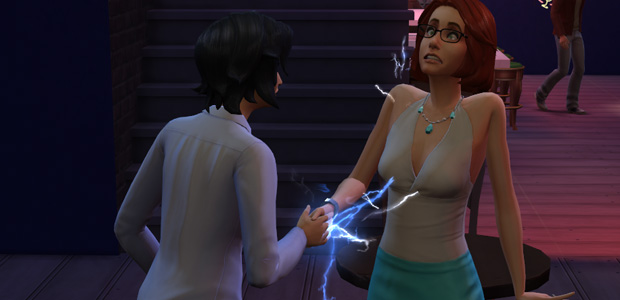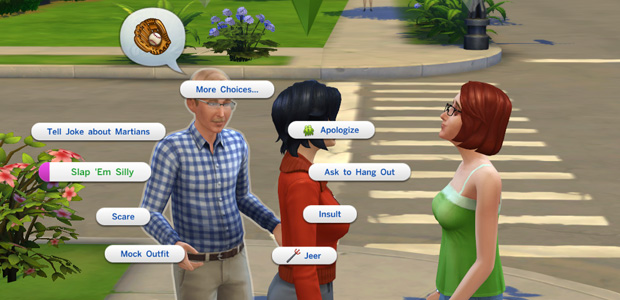Surviving With The Sims
Another mouth to feed
Note - this was originally published a month ago as part of the RPS Supporter program, hence the reference to our now-finished Survival Week.
It's Survival Week here at RPS, so I decided that I'd write about my earliest experiences with The Sims, a survival game like no other. Left to their own devices, Sims are just about smart enough to struggle through life but they're not quite intelligent enough to live. They need to be coaxed into improving their lot, and influenced by the click and the cursor. Without either clicks or cursors, I first encountered The Sims when I was struggling to build my own place in the world. Let's take a trip down the memory cul-de-sac.
I was in my late teens when I bought The Sims and it cemented itself in my life as the least escapist of entertainments. At the time, I was living in a three storey end terrace, tucked into an untidy flat conversion on the second floor. The kitchen had a single countertop surface, with just about enough space for a slice of bread ready for the buttering, and the creaky double bed almost filled the main room.
That room was the sleeping and living area. My 5-disc stereo was there, as was my small but chunky TV. My PC, which was my most valuable and valued possession, was set up on a flimsy desk in the entrance hall, which was the longer section of the L-shaped room that contained the excuse for a kitchen on its shorter strut. Next to the computer, there was an ugly reminder of the price of living in the form of an electricity meter. As I played games, I could see the counter ticking down slowly, which made me feel as if I'd brought the world's most generous coin-op to live with me. A constant reminder that money was short and that entertainment has a price.
I played Diablo II more than anything else. It connected me to a happier time, as I'd started playing just before I left home for the last time - that's the home, the childhood place, the one you sometimes think you're waking up in even though strangers have lived there for years - and even though every new piece of equipment made him less recognisable, my paladin was a thread of continuity with the past. When I click-click-clicked my way through Hell, I could have been back in my old bedroom, away from the electricity meter and the weary noise of my unseen neighbour.
This neighbour was a man whose name I never knew. He lived on the ground floor and if I had the cheek to walk around the flat after 9pm, he'd bang on his ceiling (my floor) with the handle of a broom. Twice, he came up the stairs and hammered on the door to complain about the noise. Not the noise of loud music or even a television, you understand, just the sound of footsteps on the floor. Sometimes I was wearing socks.
I only caught a glimpse of my neighbour's flat once, when I was leaving the building and the door had been left wide open. Every wall was plastered with newspaper clippings of the royal family, yellowing and peeling. There was an oxygen cylinder leaning against the sofa, with rubber tubing attached. It was the same semi-portable machine that had made the trip upstairs to complain to my face such an arduous journey.
Guilt is my constant companion and even though I was within my rights to walk inside my own flat, I felt terrible that my existence was an inconvenience. That's in spite of the fact that every encounter with the neighbour involved withering in the face of torrential abuse and flecks of phlegmy spittle.
The top floor of the house was home to a couple, gothy and pierced in places that I didn't even know a piercing could go. I once drove them to hospital when a failed attempt at a self-applied Prince Albert almost led to a King Charles, in that somebody nearly lost their head. They were good people and I enjoyed their company, even if they spent most of their time stoned and giggling at terrible horror films, and occasionally (once) presented bloody penises to me at 3am.
Looking back, life was grim but at the time I figured I'd just realised what the world was like away from the relative sanctity of a family home. In an attempt to run away from certain problems, I'd run into others and I hadn't even managed to run very far before clattering into a brick wall and staggering around like a cartoon concertina.
I bought The Sims shortly after release. The idea of a life simulator had fascinated me since I played Little Computer People and as I learned to live on my own for the first time, there was a pleasing parallel in the computer character I created. He began the game without a job and without a place to live, so I built one modelled on my flat. There was no way to create apartment buildings in the first version of the game so he lived in a house but it had the same layout and furniture as the place I lived.
Some people see The Sims as being inherently aspirational, and that's certainly true of later games and expansions, but there was something bleakly recognisable about the first game's struggles. While no Sim was in danger of foreclosure, and a slow spiral into obscurity and inescapable poverty, the jobs on offer were more realistic than the showbiz career paths that became the norm.
My first character joined the military career and in my strongest memories of the game, he's sitting in his uniform, after a long day at work, eating a cheap meal and surrounded by the flies that have settled on the remains of breakfast. There's a claustrophobic quality to the houses in The Sims 1 - they're detached segments of a wider world that only exists in imagination rather than parts of a neighbourhood. They are traps in which the characters survive, though without chewing off their own legs to escape.
That first Sim of mine never found friendships or a partner. He never knew anybody and nobody ever knew him. I didn't understand the game well enough to compromise its basic systems, or to step outside the confines of the basic simulation in order to advance in the career or extend the house. He lived in the L-shaped room, which was missing the meter and the thumping reminder of life below, and he struggled to top up his needs every day.
Inadvertently, I created a Sim as stubbornly stuck in one place as myself. The Sims is a survival game because characters can die through neglect and the first game is the best example of that because it's the one in which characters can be isolated from the world. Without support systems, in the form of a social top-up at the very least, they suffer.
Whether it's my memories of the game, intertwined with the life that I attempted to replicate, or whether it's the changing nature of the sequels, I remember the first Sims as a more ordinary and honest depiction of life. A Sim was analogous to a human being, but as the series has developed, they've become creatures in a world of their own. A Sim is a species now, an entity with exaggerated behaviours, tendencies toward the outrageous and the supernatural, and an entire existence based around fictions that have developed over the course of four games and a thousand expansion packs.
There are many examples of the drift toward an alternate universe but it's the language that I always come back to. Sims speak Simlish, a gibberish language invented to create the illusion of variety. If Sims spoke in a known language, or even a created language that could be decoded and translated, then their conversations and exclamations would be more obviously repetitive. Simlish, at its root, is a device that supports the simulation and roleplaying within it by leaving spaces for creative interpretation.
In the later games, Simlish has become a running joke though. Depeche Mode have recorded in Simlish. Even it cannot be directly translated, still retaining its nonsense qualities, it is more than a basic semiotic scaffold on which stories can be built - it's part of the fabric of its own world, which is not our world.
I could never recreate a place that I live in The Sims 4 because the enclosed qualities of the first game are integral to my interpretation of a home. When I open the door to the outside world, I don't see celebrities and paparazzi passing by, and people don't hang out on the pavement becoming friends and lovers as the day speeds toward the night. If the game ever was an attempt to make a simulation of life as many of us know it, the sequels moved away from that concept toward a study of life in their own commericalised cartoon world.
The Sims portrays aspiration far better than austerity, and it's a game about living rather than merely surviving. I think something has been lost in the transition toward the explicitly make-believe communities of the later games and it's partly in the elimination of struggle. Perhaps it was never as much a part of the first game as I remember it being but if I were to create myself in the game now, it would be the goofy 'best' version of myself rather than the lonely man in the L-shaped room. Character creation sometimes feels like drawing a line somewhere on the spectrum between Ross and Joey, picking the sitcom stooge I'd like to mimic.
In The Sims 3, I'd often find myself choosing between two fantastical ideas - whether to invest my time and money in a rockstar lifestyle or houseproud perfection - but I don't remember ever having to choose between paying the bills or repairing the television. I don't remember ever having to feed the meter.
I miss the meter sometimes. I despised the fucking thing, but I miss having that mouth to feed. Life back then, during my own personal great depression, was about caution and care, and while I had more safety nets than most (and probably more than I realised myself) there were times when I wished I could revert to an autosave. I wish I still had that Sims household because it was the closest thing I had to a diary at that time. I wonder if I could still read it and if I'd understand its own brand of Simlish. I wonder if it'd be any more or less accurate than what I've written here.
You can read more Survival Week articles over here.













